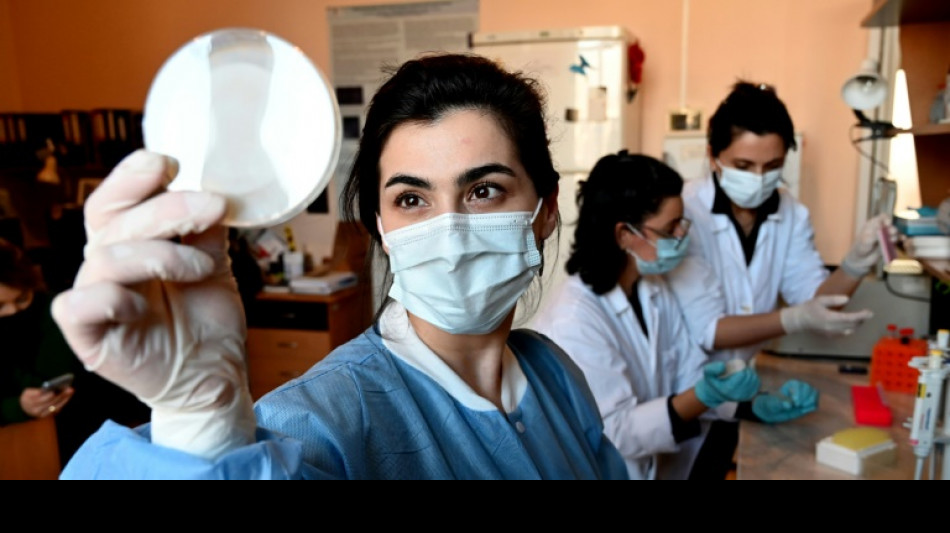
-
 Switch 2 sales boost Nintendo results but chip shortage looms
Switch 2 sales boost Nintendo results but chip shortage looms
-
From rations to G20's doorstep: Poland savours economic 'miracle'

-
 Russia resumes strikes on freezing Ukrainian capital
Russia resumes strikes on freezing Ukrainian capital
-
'Way too far': Latino Trump voters shocked by Minneapolis crackdown

-
 England and Brook seek redemption at T20 World Cup
England and Brook seek redemption at T20 World Cup
-
Coach Gambhir under pressure as India aim for back-to-back T20 triumphs

-
 'Helmets off': NFL stars open up as Super Bowl circus begins
'Helmets off': NFL stars open up as Super Bowl circus begins
-
Japan coach Jones says 'fair' World Cup schedule helps small teams

-
 Equities and precious metals rebound after Asia-wide rout
Equities and precious metals rebound after Asia-wide rout
-
Do not write Ireland off as a rugby force, says ex-prop Ross

-
 Winter Olympics 2026: AFP guide to Alpine Skiing races
Winter Olympics 2026: AFP guide to Alpine Skiing races
-
Winter Olympics to showcase Italian venues and global tensions

-
 Buoyant England eager to end Franco-Irish grip on Six Nations
Buoyant England eager to end Franco-Irish grip on Six Nations
-
China to ban hidden car door handles in industry shift

-
 Sengun leads Rockets past Pacers, Ball leads Hornets fightback
Sengun leads Rockets past Pacers, Ball leads Hornets fightback
-
Waymo raises $16 bn to fuel global robotaxi expansion

-
 Netflix to livestream BTS comeback concert in K-pop mega event
Netflix to livestream BTS comeback concert in K-pop mega event
-
Rural India powers global AI models

-
 US House to vote Tuesday to end shutdown
US House to vote Tuesday to end shutdown
-
Equities, metals, oil rebound after Asia-wide rout

-
 Bencic, Svitolina make history as mothers inside tennis top 10
Bencic, Svitolina make history as mothers inside tennis top 10
-
Italy's spread-out Olympics face transport challenge

-
 Son of Norway crown princess stands trial for multiple rapes
Son of Norway crown princess stands trial for multiple rapes
-
Side hustle: Part-time refs take charge of Super Bowl

-
 Paying for a selfie: Rome starts charging for Trevi Fountain
Paying for a selfie: Rome starts charging for Trevi Fountain
-
Faced with Trump, Pope Leo opts for indirect diplomacy

-
 NFL chief expects Bad Bunny to unite Super Bowl audience
NFL chief expects Bad Bunny to unite Super Bowl audience
-
Australia's Hazlewood to miss start of T20 World Cup

-
 Bill, Hillary Clinton to testify in US House Epstein probe
Bill, Hillary Clinton to testify in US House Epstein probe
-
Cuba confirms 'communications' with US, but says no negotiations yet

-
 Iran orders talks with US as Trump warns of 'bad things' if no deal reached
Iran orders talks with US as Trump warns of 'bad things' if no deal reached
-
From 'watch his ass' to White House talks for Trump and Petro

-
 Liverpool seal Jacquet deal, Palace sign Strand Larsen on deadline day
Liverpool seal Jacquet deal, Palace sign Strand Larsen on deadline day
-
Trump says not 'ripping' down Kennedy Center -- much

-
 Sunderland rout 'childish' Burnley
Sunderland rout 'childish' Burnley
-
Musk merges xAI into SpaceX in bid to build space data centers

-
 Former France striker Benzema switches Saudi clubs
Former France striker Benzema switches Saudi clubs
-
Sunderland rout hapless Burnley

-
 Costa Rican president-elect looks to Bukele for help against crime
Costa Rican president-elect looks to Bukele for help against crime
-
Hosts Australia to open Rugby World Cup against Hong Kong

-
 New York records 13 cold-related deaths since late January
New York records 13 cold-related deaths since late January
-
In post-Maduro Venezuela, pro- and anti-government workers march for better pay

-
 Romero slams 'disgraceful' Spurs squad depth
Romero slams 'disgraceful' Spurs squad depth
-
Trump urges 'no changes' to bill to end shutdown

-
 Trump says India, US strike trade deal
Trump says India, US strike trade deal
-
Cuban tourism in crisis; visitors repelled by fuel, power shortages

-
 Liverpool set for Jacquet deal, Palace sign Strand Larsen on deadline day
Liverpool set for Jacquet deal, Palace sign Strand Larsen on deadline day
-
FIFA president Infantino defends giving peace prize to Trump

-
 Trump cuts India tariffs, says Modi will stop buying Russian oil
Trump cuts India tariffs, says Modi will stop buying Russian oil
-
Borthwick backs Itoje to get 'big roar' off the bench against Wales


Viruses that could save millions of lives
It may seem strange after a pandemic that has killed millions and turned the world upside down, but viruses could save just as many lives.
In a petri dish in a laboratory in the Georgian capital Tbilisi, a battle is going on between antibiotic resistant bacteria and "friendly" viruses.
This small nation in the Caucasus has pioneered research on a groundbreaking way to tackle the looming nightmare of bacteria becoming resistant to the antibiotics on which the world depends.
Long overlooked in the West, bacteriophages or bacteria-eating viruses are now being used on some of the most difficult medical cases, including a Belgian woman who developed a life-threatening infection after being injured in the 2016 Brussels airport bombing.
After two years of unsuccessful antibiotic treatment, bacteriophages sent from Tbilisi cured her infection in three months.
"We use those phages that kill harmful bacteria" to cure patients when antibiotics fail, Mzia Kutateladze of the Eliava Institute of Bacteriophages told AFP.
Even a banal infection can "kill a patient because the pathogen has developed resistance to antibiotics," Kutateladze said.
In such cases, phagotherapy "is one of the best alternatives", she added.
Phages have been known about for a century, but were largely forgotten and dismissed after antibiotics revolutionised medicine in the 1930s.
- Stalin's henchman -
It didn't help that the man who did most to develop them, Georgian scientist Giorgi Eliava, was executed in 1937 on the orders of another Georgian, Lavrentiy Beria, Stalin's most notorious henchman and the head of his secret police.
Eliava had worked in the Pasteur Institute in Paris with French-Canadian microbiologist Felix d'Herelle, one of the two men credited with discovering phages, and persuaded Stalin to invite him to Tbilisi in 1934.
But their collaboration was cut short when Beria had Eliava killed, although his motive still remains a mystery.
With the World Health Organization now declaring antimicrobial resistance a global health crisis, phages are making a comeback, especially as they can target bacteria while leaving human cells intact.
A recent study warned that superbugs could kill as many as 10 million people a year when antimicrobial resistance due to overuse of antibiotics reaches a tipping point. That could come within three decades.
- 'Training' viruses -
While phages-based medicines cannot completely replace antibiotics, researchers say they have major pluses in being cheap, not having side-effects nor damaging organs or gut flora.
"We produce six standard phages that are of wide spectrum and can heal multiple infectious diseases," said Eliava Institute physician Lia Nadareishvili.
In some 10 to 15 percent of patients, however, standard phages don't work and "we have to find ones capable of killing the particular bacterial strain," she added.
Tailored phages to target rare infections can be selected from the institute's massive collection -- the world's richest -- or be found in sewage or polluted water or soil, Kutateladze said.
The institute can even "train" phages so that "they can kill more and more different harmful bacteria."
"It is a cheap and easily accessible therapy," she added.
- Last-resort treatment -
A 34-year-old American mechanical engineer suffering from a chronic bacterial disease for six years told AFP he "already felt improvement" after two weeks at the Tbilisi institute.
"I've tried every possible treatment in the United States," said Andrew, who would only give his first name.
He is one of the hundreds of patients from around the globe who arrive in Georgia every year for last-resort treatment, said Nadareishvili.
With the traditional antimicrobial armoury depleting rapidly, more clinical studies are needed so that phagotherapy can be more widely approved, Kutateladze argued.
In 2019, the United States Food and Drug Administration (FDA) authorised a clinical study on the use of bacteriophages to cure secondary infections in Covid patients.
Beyond medicine, phages are already being used to stop food going off, and they "can be used in agriculture to protect crops and animals from harmful bacteria," Kutateladze said.
The institute has already conducted research on bacteria targeting cotton and rice.
Bacteriophages also have potential to counter biological weapons and combat bioterrorism, with Canadian researchers publishing a 2017 study on using them to counter an anthrax attack on crowded public places.
C.Meier--BTB




